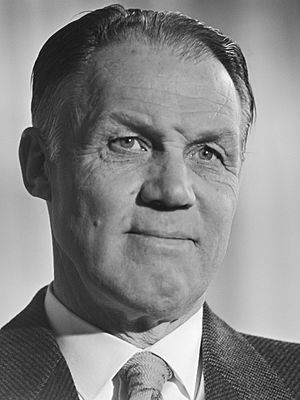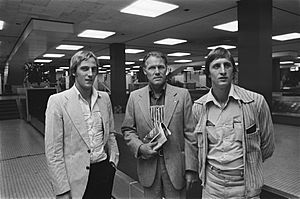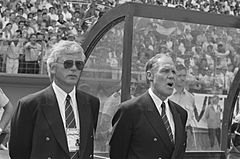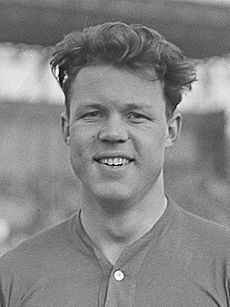Rinus Michels facts for kids

Michels in 1984
|
||||||||||||||||||||||
| Personal information | ||||||||||||||||||||||
|---|---|---|---|---|---|---|---|---|---|---|---|---|---|---|---|---|---|---|---|---|---|---|
| Full name | Marinus Jacobus Hendricus Michels | |||||||||||||||||||||
| Date of birth | 9 February 1928 | |||||||||||||||||||||
| Place of birth | Amsterdam, Netherlands | |||||||||||||||||||||
| Date of death | 3 March 2005 (aged 77) | |||||||||||||||||||||
| Place of death | Aalst, Belgium | |||||||||||||||||||||
| Height | 1.86 m (6 ft 1 in) | |||||||||||||||||||||
| Position(s) | Striker | |||||||||||||||||||||
| Youth career | ||||||||||||||||||||||
| 1940–1946 | Ajax | |||||||||||||||||||||
| Senior career* | ||||||||||||||||||||||
| Years | Team | Apps | (Gls) | |||||||||||||||||||
| 1946–1958 | Ajax | 264 | (122) | |||||||||||||||||||
| International career | ||||||||||||||||||||||
| 1950–1954 | Netherlands | 5 | (0) | |||||||||||||||||||
| Managerial career | ||||||||||||||||||||||
| 1953–1954 | Asser Boys | |||||||||||||||||||||
| 1960–1964 | JOS | |||||||||||||||||||||
| 1964–1965 | A.F.C. | |||||||||||||||||||||
| 1965–1971 | Ajax | |||||||||||||||||||||
| 1971–1974 | Barcelona | |||||||||||||||||||||
| 1974 | Netherlands | |||||||||||||||||||||
| 1975–1976 | Ajax | |||||||||||||||||||||
| 1976–1978 | Barcelona | |||||||||||||||||||||
| 1979–1980 | Los Angeles Aztecs | |||||||||||||||||||||
| 1980–1983 | 1. FC Köln | |||||||||||||||||||||
| 1984–1985 | Netherlands | |||||||||||||||||||||
| 1986–1988 | Netherlands | |||||||||||||||||||||
| 1988–1989 | Bayer Leverkusen | |||||||||||||||||||||
| 1990–1992 | Netherlands | |||||||||||||||||||||
|
Medal record
|
||||||||||||||||||||||
| *Club domestic league appearances and goals | ||||||||||||||||||||||
Rinus Michels (born February 9, 1928 – died March 3, 2005) was a famous Dutch football player and coach. He played his whole career for Ajax, a famous Dutch club. Later, he also coached Ajax. He also played for and coached the Dutch national team four different times. Many people think he was one of the greatest football coaches ever.
Michels is most famous for his coaching success. He won the European Cup with Ajax and the Spanish league with Barcelona. As coach of the Netherlands national team, he led them to the final of the 1974 FIFA World Cup. He also guided them to win the 1988 UEFA European Championship.
He is known for creating a major football style called "Total Football" in the 1970s. In 1999, FIFA named him Coach of the Century. In 2007, The Times newspaper called him the greatest post-war football coach. In 2019, France Football magazine said he was the greatest coach in football history.
Contents
Playing Football
Early Life and Club Career
Michels was born in Amsterdam, Netherlands. He grew up near the Olympic Stadium. For his ninth birthday in 1937, he received football boots and an Ajax jersey. Soon after, he joined Ajax as a junior player in 1940. His football journey was paused during World War II, especially during the Dutch famine of 1944–45.
On June 9, 1946, Michels joined Ajax's main team. In his first game, Ajax won 8–3, and Michels scored five goals! That season, Ajax won their league championship. A year later, they won the Dutch national championship. Michels was known for his hard work and strong heading skills.
He became a regular player for Ajax. Between 1946 and 1958, he played in 264 league matches. He scored 122 goals for the club. In 1958, he had to stop playing football because of a back injury. This was one year after he won his second league title with Ajax.
Playing for the National Team
Michels played five matches for the Dutch national team. His first game was on June 8, 1950, against Sweden, which they lost 4–1. He also lost all his other games for the national team.
Coaching Football
Leading Ajax and Barcelona

Michels returned to Ajax as head coach in 1965. With talented players like Johan Cruyff and Johan Neeskens, Ajax changed a lot. They went from a team that might be relegated (sent to a lower league) to a team that won the national championship four times. They also won the KNVB Cup three times in six years.
In 1969, Ajax reached the European Cup final for the first time. They lost 4–1 to Milan from Italy. In 1971, Michels led Ajax to win their first of three European Cups in a row. This was a huge achievement! While at Ajax, Michels created "Total Football" and used the Offside trap.
After Ajax, he moved to Barcelona in Spain in 1971. Johan Cruyff joined him there in 1973. With Michels as coach and Cruyff as a player, Barcelona won the Spanish league title in 1974. After this, Michels became the manager of the Dutch national team.
The 1974 World Cup Journey
Michels became the national coach for the Royal Dutch Football Association (KNVB) after the Netherlands qualified for the 1974 FIFA World Cup. His first game as coach was a 1–1 draw against Austria on March 27, 1974.
At the World Cup in Germany, the Dutch team impressed everyone with their exciting style of play. They won their first group easily. In the second round, they beat Argentina and the defending champions, Brazil. They reached the final after five wins and one draw. They scored 14 goals and only let in one goal in six matches.
Michels was undefeated in nine matches as the Dutch coach at this point. In the final, the Netherlands scored first against West Germany. However, the host team came back to win 2–1, ending the Dutch team's amazing run. This was the last match of Michels' first time coaching the Dutch team. He would return to coach them ten years later.
Later Coaching Years
Michels later coached in the United States in the North American Soccer League. He finished his club coaching career with Bayer Leverkusen in 1989. However, his biggest moment came when he coached the Dutch team to victory at the 1988 UEFA European Championship.
Becoming European Champions

Michels returned to coach the Dutch team for the Euro 1988 tournament. They lost their first group match against the Soviet Union (1–0). But then, they qualified for the semi-finals by beating England 3–1. Marco van Basten scored all three goals in that game. They also beat the Republic of Ireland 1–0.
For many Dutch fans, the most important match was the semi-final against West Germany. This game was seen as revenge for losing the 1974 World Cup final to them. Michels said after the match, "We won the tournament, but we all know that the semi-final was the real final." Van Basten scored in the 89th minute to win the game against Germany.
The Netherlands won the final against the Soviet Union. Ruud Gullit scored with a header, and Van Basten scored a remarkable volley. This was the Dutch national team's first major tournament win ever. It brought them back to the top of international football.
Death
Rinus Michels passed away on March 3, 2005. He died at a hospital in Aalst, Belgium, after having heart surgery.
Michels' Coaching Style and Legacy
Rinus Michels is seen as one of the greatest football managers of all time. His "Total Football" tactics were inspired by his own playing days under English manager Jack Reynolds at Ajax. Reynolds had used a similar style successfully in the 1940s.
When Michels became Ajax manager in 1965, he developed this style further. He built it around the team's main forward, Johan Cruyff. Even though Cruyff was a striker, Michels encouraged him to move freely around the field. Cruyff used his skill, creativity, and intelligence to find weaknesses in the other team. He created space and chances for goals, as well as scoring himself. Cruyff's teammates also helped by switching positions often. This made sure that the team's tactical roles were always covered.
A key part of Total Football was using space and creating it constantly. Former Ajax defender Barry Hulshoff said they always talked about "where to run and where to stand, and when not to move." He explained that players could switch positions because they understood space well. Total Football was also about being proactive. It used pressing to win the ball back or put pressure on the opponent. Another tactic was the Offside trap. With Michels' system, Ajax had great success. They won four Eredivisie titles, three KNVB Cups, and one European Cup.
Total Football's attacking style helped end the dominance of more defensive systems like Catenaccio. Catenaccio relied on players marking specific opponents and counter-attacking. In Total Football, no player was stuck in one position. Any player could become a forward, midfielder, or defender at any time. This made it hard for man-marking strategies like catenaccio to work.
In 1972, Michels' Ajax team beat Inter Milan 2–0 in the European Cup final. Inter Milan used the catenaccio system. Dutch newspapers celebrated this as the "destruction of Catenaccio" by Total Football. The next year, Ajax beat Milan 6–0 in the European Super Cup second leg. This showed how powerful Total Football was against defensive tactics.
Michels was known for his strong leadership as a coach. He was even called "The General." He once said, "Professional football is something like war. Whoever behaves too properly, is lost." This quote is often shortened to "Football is war," but Michels felt it was taken out of context. He didn't mean football was actual war.
In 1999, FIFA named Michels the coach of the century. The Rinus Michels Award, which honors the best managers in Dutch football, is named after him.
Famous Quotes
- "Professional football is something like war. Whoever behaves too properly, is lost." (Often misquoted as "Football is war.")
- "It is an art in itself to compose a starting team, finding the balance between creative players and those with destructive powers, and between defence, construction and attack – never forgetting the quality of the opposition and the specific pressures of each match."
What Others Said About Michels
- "Both as a player and as a trainer there is nobody who taught me as much as him. I will miss Rinus Michels. ... I always greatly admired his leadership." – Johan Cruyff
Career Statistics
Player
| Club performance | League | |||
|---|---|---|---|---|
| Club | Season | Division | Apps | Goals |
| Ajax | 1945–46 | Football League Championship | 12 | 13 |
| 1946–47 | 28 | 14 | ||
| 1947–48 | 5 | 3 | ||
| 1948–49 | 20 | 7 | ||
| 1949–50 | 26 | 16 | ||
| 1950–51 | 14 | 5 | ||
| 1951–52 | 19 | 15 | ||
| 1952–53 | 20 | 8 | ||
| 1953–54 | 26 | 12 | ||
| 1954–55 | 33 | 14 | ||
| 1955–56 | 30 | 8 | ||
| 1956–57 | Eredivisie | 29 | 7 | |
| 1957–58 | 2 | 0 | ||
| Career total | 264 | 122 | ||
Managerial
| Team | From | To | Record | ||||
|---|---|---|---|---|---|---|---|
| P | W | D | L | Win % | |||
| Ajax | 22 January 1965 | 30 June 1971 | 288 | 207 | 41 | 40 | 71.88 |
| Barcelona | 1 July 1971 | 30 June 1975 | 174 | 88 | 43 | 43 | 50.57 |
| Netherlands | 27 March 1974 | 7 July 1974 | 10 | 6 | 3 | 1 | 60.00 |
| Ajax | 1 July 1975 | 30 June 1976 | 43 | 27 | 8 | 8 | 62.79 |
| Barcelona | 1 July 1976 | 30 June 1978 | 94 | 47 | 25 | 22 | 50.00 |
| Los Angeles Aztecs | 1 July 1978 | 13 October 1980 | ? | ? | ? | ? | ? |
| 1. FC Köln | 14 October 1980 | 23 August 1983 | 116 | 58 | 26 | 32 | 50.00 |
| Netherlands | 14 November 1984 | 23 December 1984 | 2 | 1 | 0 | 1 | 50.00 |
| Netherlands | 29 April 1986 | 25 June 1988 | 22 | 12 | 6 | 4 | 54.55 |
| Bayer Leverkusen | 1 July 1988 | 13 April 1989 | 31 | 10 | 11 | 10 | 32.26 |
| Netherlands | 26 September 1990 | 22 June 1992 | 19 | 11 | 4 | 4 | 57.89 |
| Total | 799 | 467 | 167 | 165 | 58.45 | ||
Netherlands
| Team | Record | |||||||
|---|---|---|---|---|---|---|---|---|
| P | W | D | L | GF | GA | GD | Win % | |
| Netherlands | 53 | 30 | 13 | 10 | 98 | 32 | +66 | 56.60 |
Honours and Awards
As a Player
Ajax
- Eredivisie: 1946–47, 1956–57
As a Manager
Ajax
- Eredivisie: 1965–66, 1966–67, 1967–68, 1969–70
- KNVB Cup: 1966–67, 1969–70, 1970–71
- European Cup: 1970–71; Runner-up: 1968–69
Barcelona
- La Liga: 1973–74
- Copa del Rey: 1977–78
- Inter-Cities Fairs Cup Trophy: 1971
1. FC Köln
- DFB Pokal: 1982–83
Netherlands
- UEFA European Championship: 1988
- FIFA World Cup Runner-up: 1974
Individual Awards
- World Soccer Awards Manager of the Year: 1988
- Berlin-Britz Manager of the Decade (1970s)
- FIFA Coach of the Century: 1999
- France Football Greatest Manager of All time: 2019
- World Soccer 2nd Greatest Manager of All Time: 2013
- ESPN 2nd Greatest Manager of All Time: 2013
- Dutch Manager of the Century: 1999
- UEFA Lifetime Award: 2002
- Best Manager in 50 years of professional football in the Netherlands: 2004
Orders and Honors
- Knight of the Order of Orange-Nassau: 1974
- Officer of the Order of Orange-Nassau: 1988
- Knight of the KNVB: 2002
See also
 In Spanish: Rinus Michels para niños
In Spanish: Rinus Michels para niños
 | DeHart Hubbard |
 | Wilma Rudolph |
 | Jesse Owens |
 | Jackie Joyner-Kersee |
 | Major Taylor |


